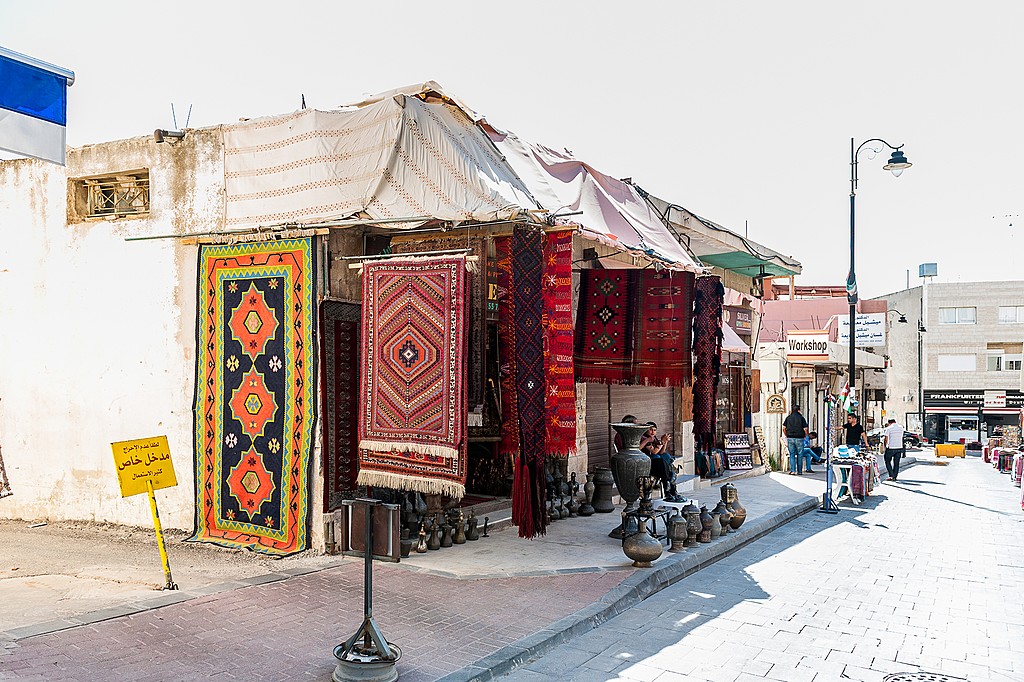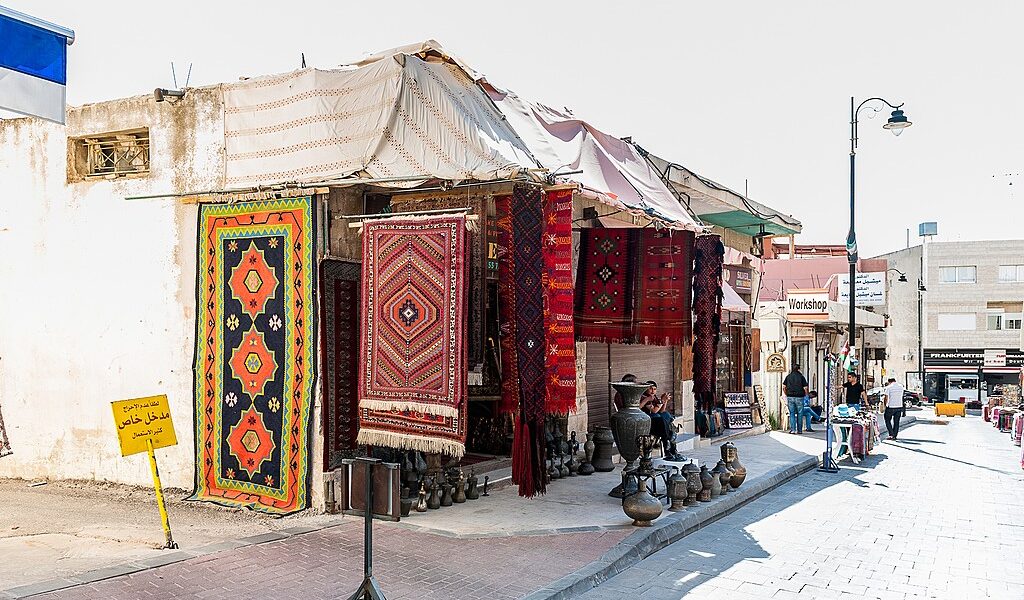
Any trip abroad merits a little souvenir shopping, but Jordan is a destination with especially beautiful and useful offerings. Pick up some luxe skincare products, support a women’s weaving initiative, or splurge on a handmade mosaic for your wall and enjoy the lasting memories of your adventure.
## Middle Eastern Spices: A Sensory Symphony of Jordan
One of the most captivating and unforgettable aspects of embarking on a trip to Jordan is undoubtedly the food. From the comforting embrace of freshly baked goods to the hearty satisfaction of meticulously prepared meat dishes, and even the delightful indulgence of dessert, aromatic spices play a central and defining role in shaping the complex and nuanced flavors that characterize the country’s culinary landscape. Za’atar stands out as one of the most frequently employed and universally recognized spice blends. Ubiquitous throughout the Middle East, this culinary cornerstone boasts a base comprised of a harmonious mixture of dried wild thyme, toasted sesame seeds, and a touch of salt. Jordan, however, often exhibits a preference for the Palestinian variety of za’atar, which frequently incorporates the subtle bitterness of caraway seeds and generous quantities of tangy sumac, another spice of paramount importance in Jordanian cooking.
Spices present themselves as an exceptionally thoughtful and practical souvenir option, encapsulating the essence of your Jordanian adventure in a tangible form. They are remarkably affordable, surprisingly lightweight, and provide a delightful means of sharing your travel experiences with friends and family through the simple act of preparing a meal. The purchasing experience itself is an engaging and enriching one, offering the opportunity to savor the numerous variations of za’atar, each with its own unique profile, and to inhale the intoxicating aromas of meticulously crafted tea blends in local shops. Spice vendors are a common sight in virtually every town and city across Jordan, but for an especially rewarding experience, consider visiting **Karkadeh**, a well-regarded establishment situated on the bustling **King Faisal Street** in downtown Amman. While the owner may initially appear somewhat gruff, they are known for being helpful and patient, readily offering samples before you commit to a purchase. A valuable pro tip: **Karkadeh** also boasts a fun and enticing selection of Middle Eastern candy available for purchase. Be sure to sample the chocolate-covered Medjool dates, generously stuffed with crunchy almonds, a truly delightful treat.
## Mosaic Tilework: Echoes of History in Stone
Mosaic tilework possesses a rich and deeply rooted history in Jordan, spanning thousands of years and reflecting the artistic sensibilities of bygone eras. The most celebrated and iconic example of this enduring art form is undoubtedly the **Madaba Map**. This remarkable floor mosaic, discovered within a church founded in the 6th century CE, is widely believed to be the oldest surviving map of the region, encompassing Jerusalem and the area revered as the “Holy Land.” In close proximity to the **Madaba Map**, at the **Church of Moses** located on **Mount Nebo**, visitors can discover even more exquisite examples of meticulously preserved mosaic art dating back to roughly the same time period, providing further insight into the region’s artistic heritage.
While these irreplaceable ancient artworks are not available for purchase, the captivating craft of mosaic creation remains vibrantly alive and well in Madaba. To gain a deeper appreciation for this art form, consider booking a tour at the **Madaba Institute for Mosaics Art and Restoration** (MIMAR), situated on **Hussein bin Ali Street**. Here, students diligently learn the time-honored techniques of preserving Byzantine mosaics, and visitors can observe the painstaking restoration projects in progress. Following your tour, venture to one of the numerous workshops and showrooms that line the road leading into Madaba, each showcasing the diverse array of mosaic artwork produced in the region. While most establishments carry authentic pieces crafted in Jordan, it’s always prudent to seek a local reference and inquire about the origin and provenance of any piece that captures your interest. **Jordan Jewel Art & Mosaic** is a reputable option, and a purchase from this establishment will directly support the local artisans, many of whom live with disabilities, fostering economic empowerment and community well-being.
## Bedouin Weavings: Threads of Tradition and Heritage
The intricate and time-honored craft of ground loom weaving has been lovingly passed down through generations of Bedouin women, representing a tangible link to their cultural heritage. Traditional designs, characterized by bold stripes and striking geometric patterns, are meticulously created using yarn sourced from sheep wool (or, less commonly, goat and camel hair), with some weavers utilizing natural dyes derived from indigenous plants, such as the vibrant red hues of sumac berries and the deep blues of indigo. Bedouins traditionally utilize woven fabrics for a range of practical purposes, including the construction of tents, the creation of saddlebags, and the production of protective clothing. Travelers, however, will discover a diverse array of products tailored to their needs and preferences, including rugs, bags, and tapestries, offering a tangible piece of Bedouin artistry to take home. Many of these woven goods are sold by organizations dedicated to benefiting local Bedouin communities, ensuring that your purchase directly supports their livelihoods and cultural preservation.
A valuable resource for sourcing rugs and tablecloths is the **Jordan River Foundation Showroom** located on Rainbow Street in Amman. Your purchase from this establishment will directly contribute to supporting a number of women’s weaving initiatives. One such initiative is **Bani Hamida**, a social project that has successfully revitalized the craft’s economy in the village of Mukawir. A visit to the workshop provides the opportunity to witness the ground looms in action, offering a firsthand glimpse into the artistry and dedication of the weavers. Another notable source for woven goods is the **Lumeyo Weaving Project** in Udruh, a village located near Petra. Here, local ladies weave fun yoga mats and totes, playfully dubbed “BedouBags,” in bold and sophisticated patterns that blend traditional aesthetics with contemporary sensibilities. You can find their exquisite handiwork at **Sakinah Yoga Studio** and **Urdon Shop** in Amman. Alternatively, consider embarking on an even more enriching experience by taking a weaving class and meeting the makers themselves at the Udruh studio, gaining a deeper understanding of the craft and the community that sustains it.
## Arabic Coffee Pots: Vessels of Hospitality and Tradition
It goes without saying that you will undoubtedly consume a significant amount of coffee during your time in Jordan. Offered generously (along with tea) by friends, shopkeepers, and even complete strangers, coffee is brewed in the traditional Arabic manner: coffee grounds, water, and a generous pinch of cardamom are heated together in either a *dallah*—the large and iconic coffee pot pictured above—or a smaller pot with an open top and a long handle, each vessel embodying a distinct aspect of Arabic coffee culture. The resulting brew is then served unfiltered and incredibly strong, accompanied by copious amounts of sugar, catering to the Jordanian penchant for intensely sweet beverages.
While you may revert to your familiar caffeine routine upon your return home, these brass or copper pots serve as beautiful decorative pieces for the kitchen, offering a perfect and enduring reminder of the warmth and generosity of Jordanian hospitality. Ranging from plain and functional designs to ornately decorated masterpieces, most *dallah* pots are not manufactured in Jordan itself, but rather in other Middle Eastern countries and Turkey. Nevertheless, you will find ample opportunities to purchase them throughout Jordan. Your best bets for securing a *dallah* are the numerous shops and the vibrant indoor souk located in downtown Amman, where you can immerse yourself in the bustling atmosphere and haggle for the perfect souvenir.
## Organic Skincare: Nurturing Wellness with Local Treasures
Jordan is a veritable wellspring of wellness experiences, offering a diverse array of opportunities for rejuvenation and self-care. From tranquil yoga retreats nestled in the heart of the desert to healing floats in the mineral-rich waters of the Dead Sea, Jordan allows you to return home feeling as refreshed and revitalized as you desire. Spas abound throughout the country, ranging from traditional *hammams* that evoke centuries of bathing rituals to luxurious resort facilities that offer the latest in pampering treatments. Many of these spas utilize oils, creams, and other products crafted in Jordan, incorporating local ingredients such as nourishing olive oil, antioxidant-rich pomegranate, and therapeutic Dead Sea mud—all of which are typically available for purchase, allowing you to extend your spa experience long after your vacation comes to an end.
One of the most highly regarded bath and body lines, **Trinitae,** can be discovered tucked away on a quiet stretch of Rainbow Street in Amman, housed within an airy villa known as the **Soap House** (which is worth a visit in its own right, even if only to relax on the pleasant patio). **Trinitae** is a multi-generation family business that offers a dizzying array of bath salts, scrubs, lotions, and other skincare products, all meticulously crafted with natural ingredients sourced directly from Jordan. Consider picking up some Dead Sea bath salts infused with dried roses, fragrant olive oil hand soap, or natural loofahs enriched with the soothing scents of lavender or citrus. If you happen to find yourself outside of Amman, consider booking a massage at the **Kempinski Ishtar Dead Sea** spa instead, where they utilize Trinitae aromatherapy oils and other products to enhance the relaxation and therapeutic benefits of your treatment.
## Traditional Ceramics & Pottery: Artistry in Earth and Color
Jordan is widely celebrated for its exquisite handpainted ceramics, and travelers will discover abundant opportunities to acquire plates, tiles, and other wares adorned with geometric floral designs, often featuring blue as the dominant color. You’ll find particularly lovely examples of these ceramics at the **Beit al Bawadi** showroom, located in Amman’s upscale Abdoun neighborhood. Founded by a Jordanian nonprofit organization, Beit al Bawadi provides employment to local artisans who are trained in traditional ceramic techniques, ensuring the preservation of this cultural heritage. If you happen to be in the market for something with a more contemporary aesthetic, **Silsal Ceramics,** also located in Abdoun, offers a modern interpretation of Jordanian ceramic design, blending traditional motifs with contemporary sensibilities. (A fun fact: *silsal* is the Arabic word for “clay.”)
For those seeking Nabataean clay pottery, a trip to the **Petra Pottery Association** in Taybeh, a village nestled in the hills above Wadi Musa, is highly recommended. This workshop was established with the specific goal of preserving ancient earthenware production methods. The bowls and vases are meticulously made by hand using bronze-colored clay sourced from the local mountains and painted with natural pigments, reflecting the artistry and ingenuity of the Nabataean civilization. As these pieces are undeniably fragile, it’s prudent to consider carrying them onto the plane with you when heading home, ensuring their safe arrival and allowing you to treasure these tangible reminders of your Jordanian adventure.
B-1492

